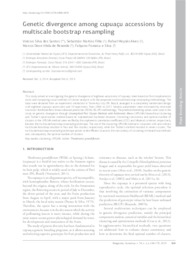Genetic divergence among cupuaçu accessions by multiscale bootstrap resampling.
Genetic divergence among cupuaçu accessions by multiscale bootstrap resampling.
Author(s): ALVES, R. M.; RESENDE, M. D. V. de
Summary: This study aimed at investigating the genetic divergence of eighteen accessions of cupuaçu trees based on fruit morphometric traits and comparing usual methods of cluster analysis with the proposed multiscale bootstrap resampling methodology. The data were obtained from an experiment conducted in Tomé-Açu city (PA, Brazil), arranged in a completely randomized design with eighteen cupuaçu accessions and 10 repetitions, from 2004 to 2011. Genetic parameters were estimated by restricted maximum likelihood/best linear unbiased prediction (REML/BLUP) methodology. The predicted breeding values were used in the study on genetic divergence through Unweighted Pair Cluster Method with Arithmetic Mean (UPGMA) hierarchical clustering and Tocher's optimization method based on standardized Euclidean distance. Clustering consistency and optimal number of clusters in the UPGMA method were verified by the cophenetic correlation coefficient (CCC) and Mojena's criterion, respectively, besides the multiscale bootstrap resampling technique. The use of the clustering UPGMA method in situations with and without multiscale bootstrap resulted in four and five clusters, respectively, while the Tocher's method resulted in seven clusters. The multiscale bootstrap resampling technique proves to be efficient to assess the consistency of clustering in hierarchical methods and, consequently, the optimal number of clusters.
Publication year: 2015
Types of publication: Journal article
Unit: Embrapa Eastern Amazon
Keywords: Cupuaçu, Fruta Tropical, Genética, UPGMA
Observation
Some of Embrapa's publications are published as ePub files. To read them, use or download one of the following free software options to your computer or mobile device. Android: Google Play Books; IOS: iBooks; Windows and Linux: Calibre.
Access other publications
Access the Agricultural Research Database (BDPA) to consult Embrapa's full library collection and records.
Visit Embrapa Bookstore to purchase books and other publications sold by Embrapa.

